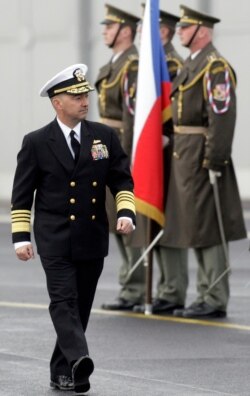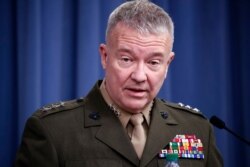The United States needs to maintain its current number of troops in Afghanistan to protect the progress made in the country, the retired U.S. Navy admiral, James Stavridis, told VOA in an interview.
“Use our U.S. troops and coalition troops to support the Afghan security forces, and let’s have a period of stability before we make any further reductions,” Stavridis said.
The U.S.-Taliban deal has stipulated a phased pull out of all U.S. forces by May 2021 but only if the Taliban meet the conditions in the agreement. Already reducing the number of the troops to 8,600, Washington says that the withdrawal is on schedule.
However, Stavridis, who served as a commander of the U.S. European Command and NATO’s Supreme Allied Commander for Europe from 2009 to 2013, said that any further reduction should be based “completely on conditions on the ground.”
He charged that al-Qaida and Islamic State are still active in the Central and South Asian country as the Taliban continue its violence.
“There is no reason to believe that if we leave the Taliban will not simply re-embrace al-Qaida, and we will be right back where we started this story,” he warned.
In late May, President Donald Trump called for a quick withdrawal of U.S. forces from Afghanistan after 19 years of war, adding to speculations in Washington that he may order the remaining U.S. troops to leave the country before the November election.
“Bring our soldiers back home but closely watch what is going on and strike with a thunder like never before, if necessary!" Trump said in a tweet in May, adding the U.S. troops in Afghanistan were acting as “a police force, not a fighting force.”
In a videoconference hosted by the Middle East Institute on June 10, General Frank McKenzie, the head of U.S. Central Command, said the Taliban group has yet to meet conditions required for a complete U.S. troop withdrawal. He said removing all troops would depend on certain conditions.
“Those conditions would be: Can we be assured that attacks against us will not be generated there? And as of right now ... frankly, if asked my opinion, those conditions have not been met.”
Position of strength
Admiral Stavridis told VOA Afghan Service that negotiations with the Taliban should be from a position of strength. He added that military pressure on the group, forcing it to negotiate with the Afghan government, and economic assistance to Kabul should be the U.S. approach to the negotiations.
“If we do those three things … I think there is a better than even chance that we will ultimately find our way to a negotiated settlement,” adding that continued military pressure on the Taliban will force the group not only into reducing its militant violence but also showing sincerity in the negotiations.
Rejecting the accusations, the Taliban say they want the peace deal to succeed.
Jalaluddin Shinwari, a former Taliban attorney general, told VOA that the Taliban group is “committed to implement all the provisions of the agreement.”
“And, when the provisions of the agreement are implemented,” Shinwari added, “there would be no problem for the timing and deadline of the U.S. withdrawal.”
Russian bounties
Following reports that Russian intelligence provided Taliban militants rewards for targeting U.S. troops, Stavridis said that Russia was playing “a double game.” Russia, he said, wanted the U.S. “humiliated and driven out of Afghanistan.”
The New York Times, citing anonymous U.S. intelligence sources, reported in late June that Russia offered bounties to the Taliban for killing American and coalition troops in Afghanistan. The newspaper said that President Trump was briefed on the issue.
President Trump, however, said that he was not briefed on the subject, adding that the intelligence community did not deem the information to be credible.
Both Russia and the Taliban have rejected the allegations, and the Afghan government has not commented on the issue.
“Russia, of course has terrible memories of their own failures in Afghanistan and would like to see the United States fail as well,” Stavridis said.
He said that Russia wants to lead negotiations between Afghan parties “to create stability in that way that would be the ideal outcome for Russia.”
Ayaz Gul from Islamabad contributed to this report.






